
Wario's Woods is a puzzle video game developed and published by Nintendo. It was released in Japan and North America in 1994 and Europe in 1995 for both the Nintendo Entertainment System and the Super Nintendo Entertainment System. A spin-off of the Mario series, players control Toad in his mission to defeat Wario, who has taken control of the Peaceful Woods. Gameplay revolves around clearing each level by using bombs to destroy groups of enemies. The game also features a multiplayer mode that allows two players to compete against each other.
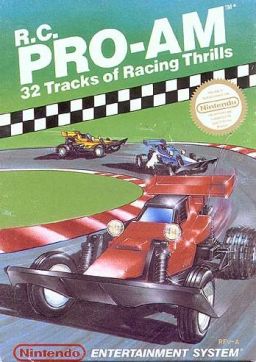
R.C. Pro-Am is a racing game developed by Rare and published by Nintendo for the Nintendo Entertainment System. It was released in North America in February 1988, and then in Europe on April 15. Presented in an overhead isometric perspective, a single player races a radio-controlled car around a series of tracks in vehicular combat. Each track qualifies its top three racers for the next track. Collectible power-up items improve performance, hazards include rain puddles and oil slicks, and missiles and bombs can temporarily disable opponents. Originally titled Pro Am Racing, it was ported to the Sega Genesis in 1992 as Championship Pro-Am, an enhanced remake with enhanced graphics and additional features. R.C. Pro-Am spawned two sequels: Super R.C. Pro-Am in 1991, and R.C. Pro-Am II in 1992.

Super Mario 64 DS is a 2004 platform game developed and published by Nintendo as a launch game for the Nintendo DS. Super Mario 64 DS is a remake of the 1996 Nintendo 64 game Super Mario 64, with new graphics, characters, collectibles, a multiplayer mode, and several extra minigames. As with the original, the plot centers on rescuing Princess Peach from Bowser. Unlike the original, Yoshi is the first playable character, with Mario, Luigi, and Wario being unlockable characters in early phases of the game.

Superman: The New Superman Adventures, commonly referred to as Superman 64, is a 1999 action-adventure game developed and published by Titus Interactive for the Nintendo 64. It is based on the television series Superman: The Animated Series and is the first 3D video game featuring Superman.
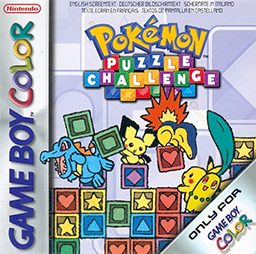
Pokémon Puzzle Challenge is a puzzle video game developed by Intelligent Systems and published by Nintendo for the Game Boy Color. Released in Japan on September 21, 2000; in North America on December 4, 2000; and in PAL regions on June 15, 2001, it is the second Pokémon-themed entry in the Puzzle League series. While its Nintendo 64 counterpart Pokémon Puzzle League is visually based on the Pokemon anime, Puzzle Challenge instead draws inspiration from the Pokémon Gold and Silver games. The game features multiple modes of play and support for competitive play between two players. Puzzle Challenge was later digitally re-released via the Nintendo 3DS's Virtual Console line on November 6, 2014.

Midnight Club: Street Racing is a 2000 racing video game developed by Angel Studios and published by Rockstar Games. The game focuses on competitive street racing and the import scene. Two distinct versions of the game were released for the PlayStation 2 and Game Boy Advance platforms, the former being a launch title for the platform. It is the first game in Midnight Club franchise, followed by Midnight Club II.

Pac-Attack, also known as Pac-Panic, is a 1993 falling-tile puzzle video game developed and published by Namco for the Super Nintendo Entertainment System and Sega Genesis. Versions for the Game Boy, Game Gear and Philips CD-i were also released. The player is tasked with clearing out blocks and ghosts without them stacking to the top of the playfield — blocks can be cleared by matching them in horizontal rows, while ghosts can be cleared by placing down a Pac-Man piece that can eat them. It is the first game in the Pac-Man series to be released exclusively for home platforms.

Sneakers, released in Japan as Nezmix: Have A Mice Day!, is a video game developed by Media.Vision and published by Microsoft Game Studios exclusively for the Xbox in 2002. Sneakers is an action-puzzle game in which the player leads a group of mice to explore a house and its surroundings to detect enemy rats and protect their group in beat 'em up fights. Marketed as making use of 'fur shading' graphics, the design of the mice in Sneakers was intended to showcase the technical capabilities of the Xbox. The game was developed as one of two Japan-exclusive launch titles for the Xbox, and was later released in North America in an exclusive distribution with Toys R Us retail stores. Upon release in Japan, Nezmix sold poorly, with critics attributing the release to contributing to the poor launch of the console in the country. The North American version of Sneakers received generally unfavorable reviews, with criticism directed at the game's linear and repetitive gameplay.

Digimon Racing is a racing video game developed by Griptonite Games and published by Bandai for the Game Boy Advance. Part of the Digimon media franchise and video game series, it utilizes Digimon's characters and elements. Its gameplay largely resembles that of traditional racing games, but also utilizes elements of kart racing and action games. Its eleven playable characters can be increased to over 40 via Digivolution.

Hercules: The Legendary Journeys is a 2000 action adventure game, based off the television series of the same name, developed by Player 1 and published by Titus Interactive for the Nintendo 64. The player controls Hercules and his friends, Iolaus and Serena, on a quest to free Zeus from the forces of Ares and Hera.
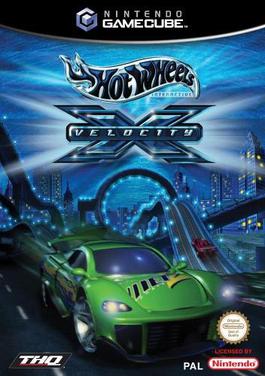
Hot Wheels: Velocity X is a 2002 vehicular combat racing game developed by Beyond Games and published by THQ based on Mattel's Hot Wheels line of scale model cars. The story follows Maxwell "Max" Justice, a teenage street racer, and his efforts to thwart the Monument City Underworld crime ring intent on stealing the Velocity X formula. Players assume the role of Max, competing in street races and demolition derbies across five locations in the greater metropolitan area.

Oddworld Adventures 2 is a Game Boy Color platform game developed by Saffire and published by GT Interactive in 2000. It is a spin-off off the Oddworld series based upon the title Oddworld: Abe's Exoddus, released in 1998.

Ridge Racer 3D is a 2011 racing video game developed and published by Namco Bandai Games for the Nintendo 3DS. It is the first Ridge Racer series title on a Nintendo platform since Ridge Racer DS (2004) and as usual for the series revolves around cars racing around high speed tracks while drifting. The game received positive reviews and was a commercial success.
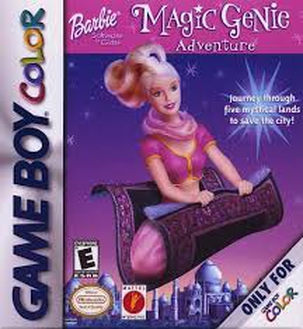
Barbie: Magic Genie Adventure is a single-player adventure/action game developed by Vicarious Visions and published by Mattel Interactive. It was released on the Game Boy Color on November 1, 2000.

Stuart Little: The Journey Home is a 2001 platform game developed by Tiertex Design Studios and published by Activision for the Game Boy Color, and is a licensed game based upon the 1999 film of the same name.

Armada F/X Racers is a 2000 video game for the Game Boy Color, developed by Metropolis Digital Inc. and published by Metro3D. The game is a futuristic-themed racing game based on the 1999 Dreamcast game Armada.
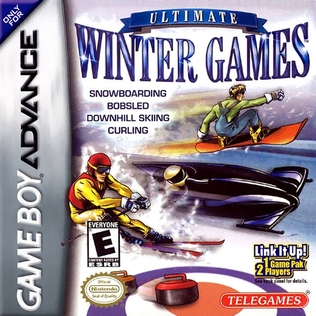
Ultimate Winter Games is a 2003 video game for the Game Boy Advance developed by Sproing Interactive and published by Telegames. The game features a set of four winter sports, including downhill skiing, curling, snowboarding and bobsledding. Upon release, the game received a mixed reception, with critics praising the game's visual presentation and critiquing its limited and simplistic series of events.
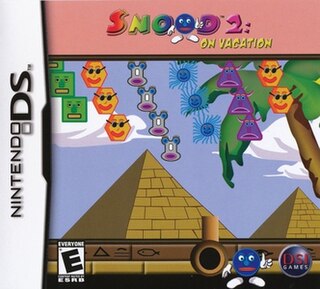
Snood 2: On Vacation is a 2005 puzzle video game developed by Gravity-i and published by Destination Software in the United States for the Game Boy Advance and Nintendo DS and Cybiko for mobile phones. Gameplay consists of clearing patterns of 'snoods' by matching pieces of the same color, in a manner similar to Puzzle Bobble or Bust-a-Move. The game is a sequel to the 1996 title Snood, ported to the Game Boy Advance in 2001. Upon release, Snood 2 met a mixed reception from critics, with praise directed to the game's variety of modes and criticism of its presentation and lack of originality.

Trick Boarder is a 2000 video game developed by Act Studio and published by Natsume for the Game Boy Color. The game is a snowboard racing video game in which player select one of eight characters to compete with other racers through nine downhill courses. Natsume adapted the engine of the game from the Game Boy Color version of Tony Hawk's Pro Skater, and showcased the game at E3 2000. Upon release, Trick Boarder received mixed to negative reviews, with criticism directed at the game's lack of variety and faulting its visual presentation and flow of gameplay.

The Flintstones: Big Trouble in Bedrock is a 2001 platform video game for the Game Boy Advance developed by H2O Entertainment. As Fred Flintstone, players complete twelve platforming levels in search of Barney Rubble, who has been kidnapped by Dr. Sinister. Publisher Conspiracy Entertainment announced Big Trouble in Bedrock in 2000 ahead of the release of the Game Boy Advance, with the game being the first licensed appearance of The Flintstones on the handheld. Upon release, the game received negative reviews, with critics focusing on the game's limited features and poor graphics.




















